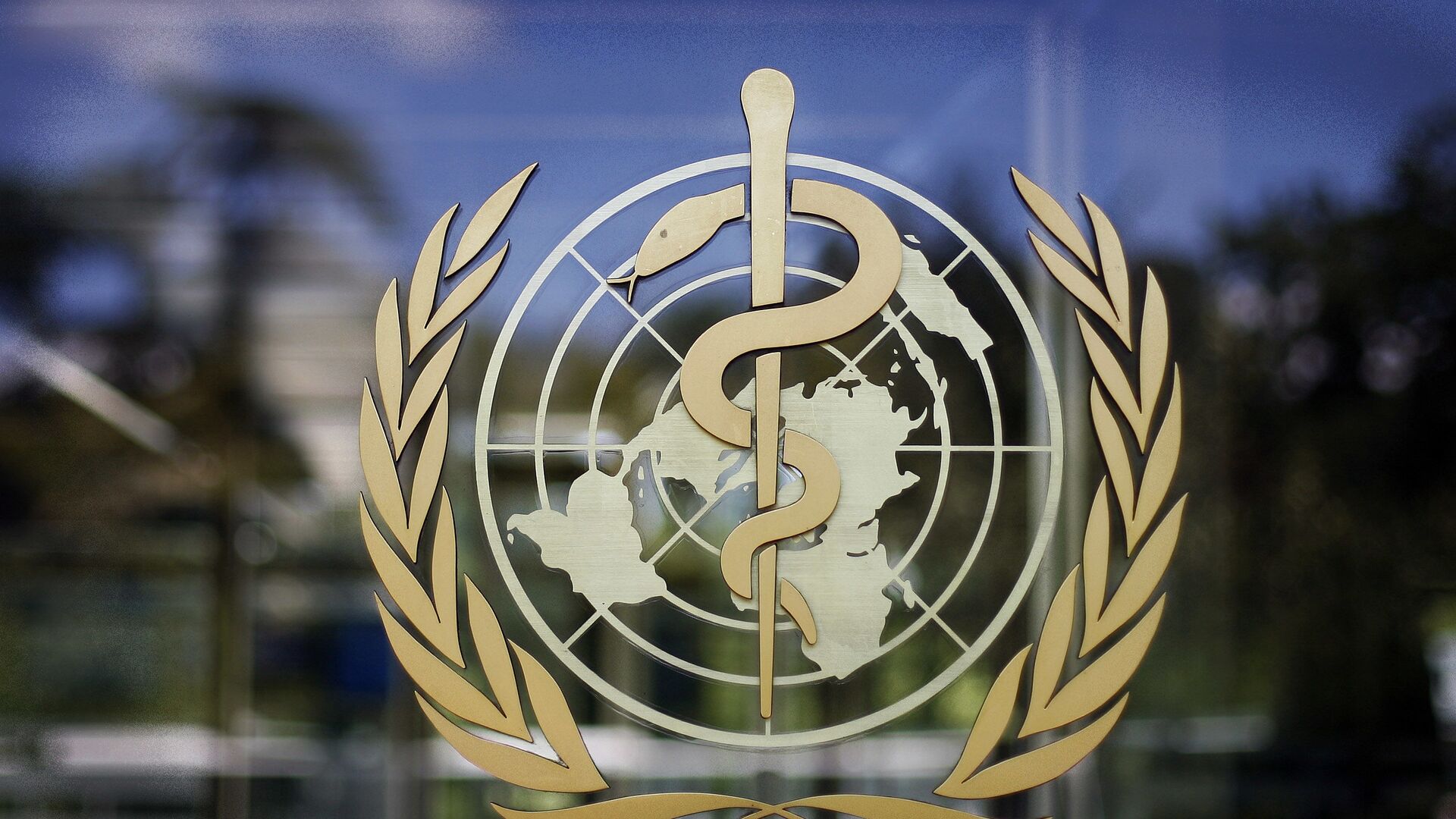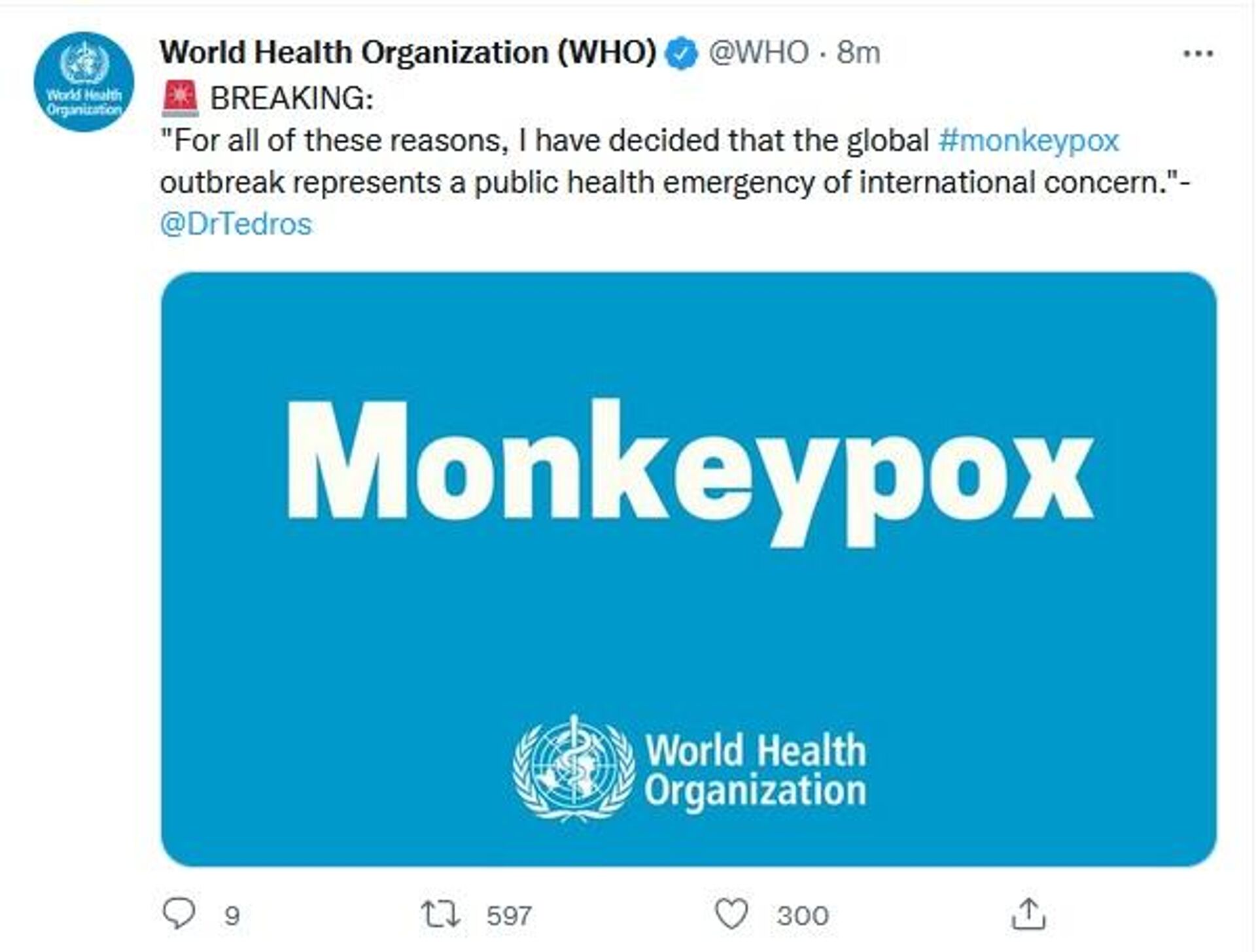https://sputnikglobe.com/20220723/who-chief-declares-monkeypox-outbreak-public-health-emergency-of-intl-concern-1097726953.html
WHO Chief Declares Monkeypox Outbreak Public Health Emergency of Int'l Concern
WHO Chief Declares Monkeypox Outbreak Public Health Emergency of Int'l Concern
Sputnik International
MOSCOW (Sputnik) - Tedros Adhanom Ghebreyesus, the director-general of the World Health Organization (WHO), on Saturday declared the current monkeypox outbreak... 23.07.2022, Sputnik International
2022-07-23T14:23+0000
2022-07-23T14:23+0000
2022-07-23T17:33+0000
world health organization (who)
monkeypox
https://cdn1.img.sputnikglobe.com/img/107896/20/1078962075_0:0:2703:1521_1920x0_80_0_0_4dea446c35b39be979ec9be5931397b1.jpg
"For all of these reasons, I have decided that the global monkeypox outbreak represents a public health emergency of international concern," Ghebreyesus told a media briefing following the meeting of the WHO Emergency Committee.The WHO chief noted that although the outbreak is a public health emergency of international concern, "for the moment this is an outbreak that is concentrated among men who have sex with men, especially those with multiple sexual partners." At the same time, he called on countries to work closely with the affected groups, stepping up awareness campaigns, and warned against discrimination and stigma."That means that this is an outbreak that can be stopped with the right strategies in the right groups," he added.The monkeypox outbreak poses a moderate risk to all regions of the world except Europe, where the WHO assesses the risk as high, Ghebreyesus said.According to the WHO chief, more than 16,000 monkeypox cases have been registered so far in 75 countries and territories, with five people dead.Monkeypox is a rare viral disease that is usually transmitted to people from wild animals and is endemic in some African countries. The disease can be transmitted through body fluids, respiratory droplets and other contaminated materials. The disease usually results in fever, rash and swollen lymph nodes.
Sputnik International
feedback@sputniknews.com
+74956456601
MIA „Rossiya Segodnya“
2022
Sputnik International
feedback@sputniknews.com
+74956456601
MIA „Rossiya Segodnya“
News
en_EN
Sputnik International
feedback@sputniknews.com
+74956456601
MIA „Rossiya Segodnya“
Sputnik International
feedback@sputniknews.com
+74956456601
MIA „Rossiya Segodnya“
world health organization (who), monkeypox
world health organization (who), monkeypox
WHO Chief Declares Monkeypox Outbreak Public Health Emergency of Int'l Concern
14:23 GMT 23.07.2022 (Updated: 17:33 GMT 23.07.2022) MOSCOW (Sputnik) - Tedros Adhanom Ghebreyesus, the director-general of the World Health Organization (WHO), on Saturday declared the current monkeypox outbreak a public health emergency of international concern.
"For all of these reasons, I have decided that the global
monkeypox outbreak represents a public health emergency of international concern," Ghebreyesus told a media briefing following the meeting of the WHO Emergency Committee.
The WHO chief noted that although the outbreak is a public health emergency of international concern, "for the moment this is an outbreak that is concentrated among men
who have sex with men, especially those with multiple sexual partners." At the same time, he called on countries to work closely with the affected groups, stepping up awareness campaigns, and warned against discrimination and stigma.
"That means that this is an outbreak that can be stopped with the right strategies in the right groups," he added.
The monkeypox outbreak poses a moderate risk to all regions of the world except Europe, where the WHO assesses the risk as high, Ghebreyesus said.
According to the WHO chief, more than 16,000 monkeypox cases have been registered so far in 75 countries and territories, with five people dead.
Monkeypox is a rare viral disease that is usually transmitted to people from wild animals and is endemic in some African countries. The disease can be transmitted through body fluids, respiratory droplets and other contaminated materials. The disease usually results in fever, rash and swollen lymph nodes.


